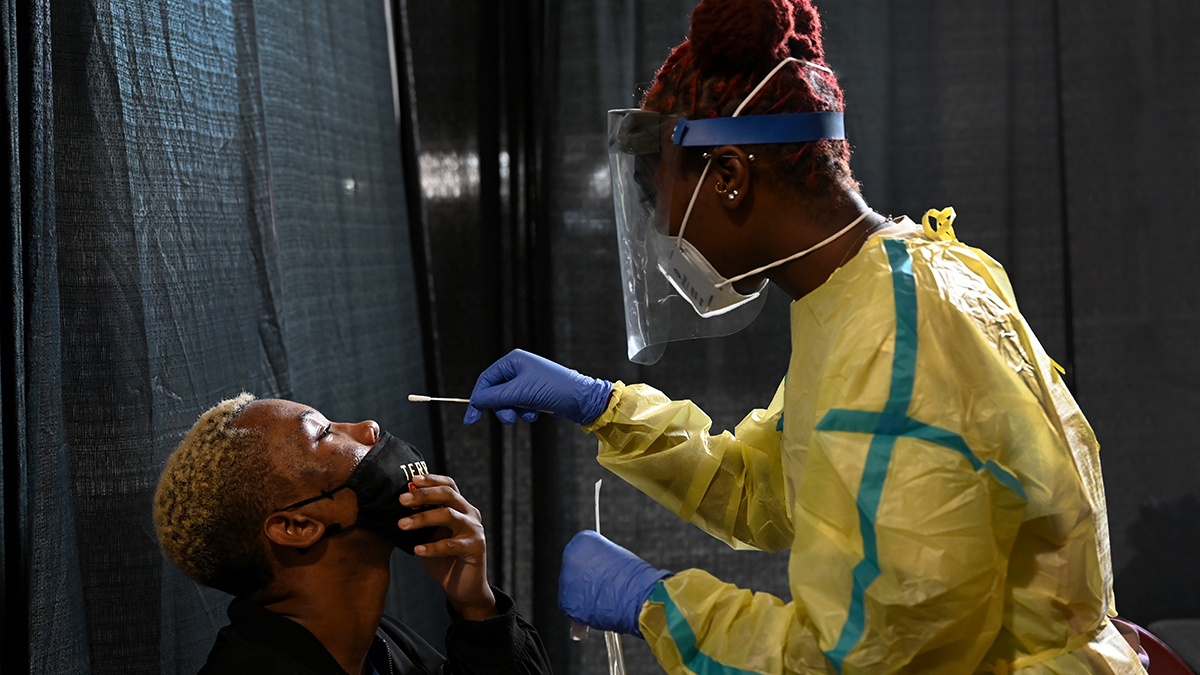The first case of a COVID-19 variant from South Africa has been diagnosed in Virginia, Gov. Ralph Northam said Friday.
The case was identified by a private lab, Northam said. He didn’t immediately note where the patient lived or if they have a recent travel history.
The South African variant – also known as the B.1.351 variant – has not been shown to cause more severe illness or increased risk of death when compared to other strains, officials say. However, the variant could be more transmissible than other variants, NBC Washington reported.
“These variants make it urgent to get as many people vaccinated, as quickly and as equitably as possible,” Northam said.
Maryland Vaccination Sites
Maryland's first two COVID-19 mass vaccination sites open Friday – one at Six Flags America in Prince George's County and the other at the Baltimore Convention Center.
Hogan and Prince George's County Executive Angela Alsobrooks visited the Six Flags site for its soft launch Friday morning at 11 a.m.
Although the site will be open to all Marylanders, the doses – at least for the next several days – are spoken for.
State officials have coordinated with Prince George’s County to conduct outreach for a subset of individuals who have pre-registered for appointments. Additional appointments through Monday, Feb. 15 will be made available to all eligible Marylanders once pre-registered individuals are scheduled.
About 250 people are expected to be vaccinated daily for the next few days at the Six Flags site. Eventually about 2,000 people will be vaccinated every day, Hogan said.
Once supply from the federal government ramps up, about 6,000 doses will be administered at the site daily, officials project.
Virginia Schools to Reopen in Mid-March
Virginia Governor Ralph Northam directed all schools to offer in-person classes by March 15, saying the Centers for Disease Control and Prevention and other leaders say it's possible to reopen safely.
Northam said families won't be required to return to in-person education, but schools should offer an option by mid-March.
"It's possible for us to have in-person learning safely," Northam said. "Everybody will come on board with this and get our children back into classrooms."
Northam pledged to take action to make sure schools take safety measures, including masking, spacing desks and sanitizing.
Loudoun County Public schools is set to offer hybrid learning to all grades by March 3 while Fairfax County Public Schools will offer the same by March 16.
Anne Arundel Loosens COVID-19 Restrictions
Anne Arundel County Executive Steuart Pittman signed an amended version of an executive order that effects some COVID-19 restrictions.
The revised order clarifies that athletes may remove their face coverings while on the field of play, once competition is permitted to resume on Feb. 8 and that wedding venues are now permitted to open to 50% capacity, or a maximum of 100 people for outdoor events.
Johnson & Johnson Asks FDA for Vaccine Approval
Johnson & Johnson has asked for emergency use approval for its single-shot COVID-19 vaccine from the Food and Drug Administration. If approved, Johnson & Johnson's shot would be the third vaccine available for use in the U.S., joining the Pfizer-BioNTech and Moderna vaccines.
President Biden Orders Hunger Relief Program
This week, President Joe Biden signed an executive order directing the Federal Emergency Management Agency to cover costs to partner with restaurants and nonprofits to prepare meals for those in need.
The order, part of the bipartisan FEED Act, was originally a section of the Biden administration's $1.9 trillion emergency relief proposal. Hunger advocates say the program allows restaurants to stay open and pay employees while providing struggling families with the food they need.
1 in 5 Virginians Don’t Plan to Get Vaccinated: Poll
Demand for the vaccine far outpaces supply, but many people aren’t eager to get the shot.
A new Wason Center poll found that 19% of Virginians said they would never get a COVID-19 vaccine. The number is higher among Black Virginians, at 26%.
Residents of Virginia who are Black are also less likely to rush to get the vaccine, the poll indicates. About half of white residents would get a shot as soon as one is available to them, compared to 29% of Black residents.
The vaccinated population in D.C. may be overestimated in this map because some non-residents who work in D.C. are included in the totals.
What the Data Shows
D.C. reported 269 new cases and eight additional deaths on Friday. Maryland had 1,547 new cases and 35 deaths. Virginia recorded 3,641 new cases and 61 lives lost.
Seven-day averages rose slightly in Virginia to 2,373 cases. Averages in Maryland (1,422) and D.C. (174) both fell on Friday.
More than 2.5 million doses of vaccine have been distributed throughout D.C., Maryland and Virginia, according to CDC data.
Vaccination Portals by County
As vaccinations in our region ramp up, here's a look at local portals residents can use to sign up for vaccination appointments or sign up to receive alerts.
- Washington, D.C. signups– vaccinate.dc.gov
- Maryland signups – www.marylandvax.org/ and covidvax.maryland.gov
- Virginia information – www.vdh.virginia.gov/covid-19-vaccine/
- Montgomery County – www.montgomerycountymd.gov/covid19/vaccine/
- Prince George's County – www.princegeorgescountymd.gov/3730/COVID-19-Vaccination
- Howard County – www.howardcountymd.gov/Departments/Health/MM-Alerts-and-Recalls/COVID-19-Vaccine
- Anne Arundel County – aahealth.org/covid-19-vaccine-faq/
- Fairfax County – www.fairfaxcounty.gov/health/novel-coronavirus/vaccine
- City of Alexandria – www.alexandriava.gov/health/info/default.aspx?id=119270
- Loudoun County – www.loudoun.gov/covid19vaccine
- Prince William County – coronavirus.pwcgov.org/vaccine-information/ & VDH
To get a better idea of when you'll be eligible to receive a vaccine, use our tool below.
Local Coronavirus Headlines
- Health officials confirmed Maryland's first case of COVID-19 caused by the new variant first identified in South Africa, then another two cases in Montgomery County residents.
- Many D.C. restaurant workers who already were coping with the safety hazards and financial impacts of the COVID-19 pandemic also are facing increased sexual harassment, a new report from a labor organization says.
- Face masks are now required in all National Park Service buildings, and on land maintained by the Park Service when physical distancing is not possible, federal officials announced Tuesday.
- Bars and restaurants in Maryland will be able to remain open past 10 p.m. starting Monday, Feb. 1, the governor announced. Restaurants will still be capped at half-capacity indoors.
- Nursing homes and rehabilitation facilities in the D.C. region are still working to convince some of their employees that it's safe to get the COVID-19 vaccine.
- Hogan outlined plans to put the infrastructure in place to speed up COVID-19 vaccinations when a higher volume of doses becomes available. Six mass vaccination sites are planned, including one at Six Flags America.
- Georgetown University says it will discipline medical students who received COVID-19 vaccines though they were not eligible to receive them.
- Just as millions of Americans are rolling up their sleeves for a COVID-19 vaccine, the News4 I-Team has learned the outgoing Secretary of Health and Human Services made it much harder to get compensated for the most common vaccine injury.
- D.C.’s child care workers are asking officials not to push back their COVID-19 vaccinations.
- Maryland Gov. Larry Hogan says school districts should resume in-person learning by March 1 or face legal action, which the state teacher's union says is a threat to educators.
- Maryland reported its first two confirmed cases of the U.K. variant of COVID-19.
- A professor is using the trust Black Americans have in barbers to make them more comfortable with taking the COVID-19 vaccine.
Reopening Tracker
- The Fairfax County School Board voted unanimously Tuesday afternoon to bring all students back in-person for hybrid learning by March 16.
- D.C. has lifted its ban on indoor dining, but libraries and recreation centers are still closed.
- Virginia instituted a curfew and a stricter mask mandate.
- Maryland tightened restrictions on businesses, bars and restaurants.
- All Smithsonian museums and the National Zoo are closed because of rising COVID-19 cases.
- Hours before some Fairfax County students were set to return to in-person learning, the school district said that they needed to delay the plan.
- Courts throughout Maryland remain partially shut down due to the pandemic.
- Prince George's County tightened restrictions and required masks to be worn outdoors.
How to Stay Safe
Anyone can get COVID-19. Here are three simple ways the CDC says you can lower your risk:
- Wear a snug-fitting mask that covers your nose and mouth.
- Avoid being indoors with people who are not members of your household. The more people you are in contact with, the more likely you are to be exposed to COVID-19. If you are indoors with people you don’t live with, stay at least six feet apart and keep your mask on.
- Wash your hands often, especially after you have been in a public place.



